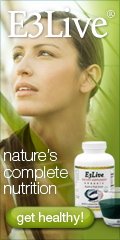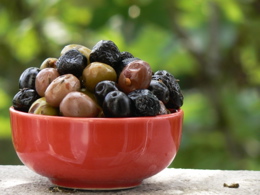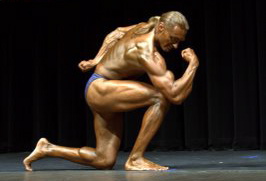|
There are far more healthy and complete vegetarian protein sources available to us than many people think.There is an endless amount of vegetarian protein sources, yet "Where do you get your protein from?" is perhaps the most common question vegans and raw vegans get asked. First of all let's look at how much protein carcass eaters actually get. Ground beef is is around 24% protein, chicken breast is roughly 35% protein and pork is somewhere around 27% (depends on the cut and diet of the animal). The rest of the percentages in these foods is by and large saturated fat, which has been well established to be hazardous to your health when it comes from animal sources. At the bottom of the food chain, all animals eat vegetarian protein sources to build their flesh. How does a Gorilla, which pound for pound is 10x stronger than a full grown man, become like this just by eating fruit, roots and green sprouts? Vegetarian protein sources provide it with all the materials it needs to do this. Furthermore the high temperatures of cooking (or pasteurization) needed to kill off the harmful pathogens in the decomposing flesh, coagulates and destroys much of the proteins in animal products. If that's not enough, the longer an animal carcass is sitting around whether frozen or not, the more amino acids break down. So for example, chicken which when raw is around 35% protein, is actually only about 18% usable protein (if you're lucky) after it's done traveling to your home and has been cooked. Also if it's not organic, chemicals can denature the amino acids in it as well. On the plant based diet side of the equation dulse (an edible seaweed) is around 40% vegan protein, chia seeds are 21% protein and spirulina can be up to 70% protein! It is actually quite accurate to say people who eat a diet of predominantly processed foods (cooking is processing) can actually develop deficiencies in some of the essential amino acids despite meat being touted as a "complete" protein. People eating centenarian foods don't develop these deficiencies. According to the Max Planck Institute for nutritional research, half of all amino acids are irreversibly damaged when heated to standard cooking temperatures.There are 20 different standard amino acids available to us. Eight of these amino acids are considered essential, meaning you have to get them in your diet because your body can't manufacture them from other nutrients. People who are getting their protein from cooked sources are at a greater risk of becoming deficient in the essential amino acid lysine. It's quite surprising that what most people think of as a high protein diet (eating plenty of animal products) is actually lacking in essential nutrients, where as someone eating a vegan raw food diet can be eating less overall amino acids, yet have less deficiencies since the amino acids are all intact when they come from raw vegetarian protein sources! (Also the enzymes needed to digest them more efficiently are still available.) The other factor that will help you develop a greater understanding of raw vegetarian protein sources is that they are actually composed of amino acids. Animal products contain proteins which must be broken down in your body, using up valuable enzymes, to create the amino acids that your body then uses to re-build into your own unique proteins. Vegetarian protein sources are mostly predigested when compared to animal based proteins, thus requiring less energy and resources for your body to assimilate. A by-product of breaking down many types of animal flesh for its amino acid content is a build of of uric acid in your body. Like cholesterol, a small amount of uric acid is necessary for biological functions, but the excessive amounts of it that animal products create in your body leads to problems down the road such as gout, kidney malfunctions and arthritis (just to name a few.) Also the excess cholesterol along with the high saturated fat content of animal products are an undisputed cause of heart disease.
Here is a list of just a few very high quality vegetarian complete protein sources. Many of these would be considered centenarian foods:Greens Fruit Seeds/Grains/nuts Legumes Other
Now on the other hand, a cooked vegan diet, although it's still better than a cooked diet with animal products in it, can be deficient in any vegetarian protein sources that are destroyed by heat. 
The intention of this article is to emphasize to you the benefits of raw vegetarian protein sources over the poor quality of cooked food proteins. You can eat a high protein vegetarian diet if you really want to. With the increasing popularity of fraudulent and dangerous dietary practices such as the Atkins diet or the South Beach diet, many people think they need larger amounts of protein then what is an adequate amount as shown by true science. Without getting too much into vilifying these dietary philosophies, I will say that even if some people are meant to eat more protein and fat in their diet, vegetarian protein sources are still available to you on a vegan raw living food diet and you will escape the harsh effects of the highly acid forming, highly toxic, unethical and ecologically disastrous effects of high meat diets. You will also be getting healthier fats as you will be replacing excessive amounts of saturated fats with mono-unsaturated and poly-unsaturated fats. When many people are first going raw, they often tend to eat large amounts of nuts and seeds to compensate for the lack of fat and (the supposed lack of) protein from animal sources. Almost always, these people move towards a diet of primarily vegetables, sprouts, superfoods and small amounts of fruit which leads to increased energy and has a powerful anti-aging benefits on the body. The excessive fat and protein of animal products will cause sluggishness and accelerate aging as can be seen in those who follow these ways of eating. If you look at the people promoting these fad-diets, you will see they never look healthy! To me this just further demonstrates the benefits of a vegetarian diet. Dr. Atkins was clinically obese and had heart disease at the time of his death. He died from a head injury after tipping over... Others recommending similar diets display saggy jowls, rolls of fat and beat red faces (inflammation). None of them have lived for any great length of time. The cultures with the highest rates of longevity are always verging on eating a vegan diet, although with small amounts of animal products here and there, but never anywhere close to the proportions these people suggest. These health "teachers" like to talk about traditional cultures that ate diets high in animal fat and protein who don't have the diseases that we do. Unfortunately they fail to realize the impact that eating 100% natural food (even if it's mostly animal products) and having an outdoor lifestyle will have a tendency to make up for the bad effects of these foods. They will often make claims such as the Inuit were free of disease. They forgot to mention however that the Inuit have the highest rates of osteoporosis in the world (from a very highly acidic diet) and have a life expectancy 10% lower than the rest of North America. An expanding waistline is strongly correlated with a contracting life-span.Another reason many people are sometimes misguided into thinking that a diet based around vegetarian protein sources is bad is that the vegans they have met happened to look very skinny or even underweight. For a new vegan, weight loss is often experienced, but this is almost always a reduction in unnecessary body-fat (although if they're not eating enough calories they may have some muscle wasting which is not a good thing). Most people who are overweight and eat animal products think that being thin and having the body-fat of an elite level athlete is unhealthy, but it's actually the ideal if you want health. Of all the best kept secrets of longevity, #1 is that barely anyone lives past 100 if they're overweight. The whole bigger is better mentality pervades diet and body image for many people. I believe this is a reaction to the portrayal of skinny as "cool" by the media and fashion industry. Overweight people often feel like they are attacked by the "skinny culture" and feel the need to attack back even if it means ignoring the fact that having extra body fat is actually unhealthy. The best determinant of health and weight can be found by looking at your BMI index. Personally, I am within my BMI ratio. I'm not underweight, yet on numerous occasions I have been insulted by people who were overweight and thought that I looked "too skinny". I believe that the origin of this mentality originates from times when food shortages and famines were always a looming possibility on everyone's mind. It's quite interesting that during these times of "shortages" people often relied on vegetarian protein sources. During the first and second world wars, rates of cancer and heart disease dropped during this time of less meat consumption. When the wars were over, the rates of diseases increased with the consumption of animal products once again. Now that we are surrounded by affluence, we no longer require to "pack on" food for storage in case we run out. It is healthy to have a slim figure. Of course I am in no way condoning eating disorders. Like I mentioned, the BMI index is a great tool for determining whether you need to lose weight or gain it. Being able to maintain muscle mass while have having a slim figure is a key to the longevity game. Vegetarian protein sources make this very easy. Play it right, or you'll be in need of a plus size wooden box sooner than you would like... Now when I say slim figure, I am referring to having a low body-fat percentage. Muscle mass is a very important component of health. To gain muscle you don't need to eat foods that cause weight gain and create impacted cross-linked amino acids (cooked protein) to build up on the interior walls of you colon, giving you that distended-abdomen-look. It adds whole new meaning to the term "you're full of it shit"! People might make assumptions about veganism from looking at the bodybuilding industry and its emphasis on meat and dairy protein. There is a growing community of vegetarian and vegan bodybuilding enthusiasts who are beginning to break these myths by building muscle mass from vegetarian protein sources.
|
Govan is available for phone and email consultations! His cutting edge anti-aging advice can take you to the next level of ultra health:

Sunwarrior Protein is 85% predigested protein and has a 98%+ absorption rate! It is raw, vegan and made from sprouted rice:
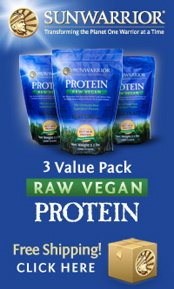
Colostrum and Elk Antler Velvet are nature's richest sources of anabolic growth factors and IGF-1!:
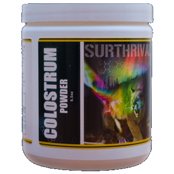
E3live is a powerful brain (and body) remineralizing tonic. It grows wild in the waters of Klamath Lake:
